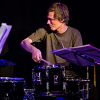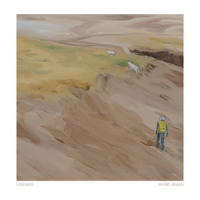Home » Jazz Articles » Album Review » Django Bates: Tenacity
Django Bates: Tenacity
Belovèd, Bates' Danish trio featuring bassist Petter Eldh and drummer Peter Bruun, already covered much Parker ground on their debut outing and official homage to the bebop royalty with Beloved Bird (Lost Marble, 2011). They continue to revisit Parker tunes at every occasion—as can be heard on the trio's sophomore outing Confirmation (Lost Marble, 2012) or the spirited rendition of Parker classic "Passport" gracing Bates' ECM Records debut The Study of Touch (2017).
On Tenacity the outfit is joined by Sweden's Norrbotten Big Band, whose hefty horn section is arranged in such a way that the trio's interplay may remain intimate while simultaneously colorfully broadened to a melodically pointillistic effect, framed in fauvistic harmonic brightness. Recorded at the Studio Acusticum in Pitéa—which is situated in the northern Swedish province that lends the Big Band its name, Norrbottens Län—after a string of live performances in 2013, Tenacity gives the listener the intriguing opportunity of revisiting material the Belovèd trio had already dealt with across their first three albums, now treated to entirely new arrangements, structures and a whole different sonic design. Like anything Bates touches, each bar and phrase of this date proves to be intricately wrought and meticulously executed, not withholding the odd wink of an eye.
Opening with a short harmonic exercise, "Cordial" sets a quiet but suspenseful mood before Parker's "Ah Leu Cha" comes spilling out of the musicians with deft swing. The polyphonous ambition of Parker's alto wrapping itself around Miles Davis' trumpet on an original version of the "Honeysuckle Rose" contrafact is expanded over big band and trio, divided in small portions over the entire breadth of the instrumentation. From dense full-scale orchestration through a fragile trio section to nothing but vocal humming, the entire range of the ensemble's dynamic repertoire is introduced within no more than the first four minutes of the album.
The intense interplay and demanding quality don't ease up throughout the set but can change appearances. With cosmetic post-production surgeries like the exaggerated delay on a short piano sequence in "Confirmation" or abrupt digital cuts amplifying the amusing effect of repetition in "Donna Lee," another dimension is added to the music, giving the project its appropriate aesthetic value, beyond its drily virtuoso nature.
At times the compositions' roots are almost unrecognizable. Either in comparison to their creator's original interpretations or earlier ones by Bèloved themself. Constantly shuffling with time, playing with rhythm, expanding the harmonic breadth and melodic depth of the objects at hand, Bates' arrangements alter the initial ideas with such vehemence that they are stripped of their old looks and given fresh faces and a renewed sense of urgency.
Still, within the tumultuous chaos of saxophone blowing competing with trumpet howling and flutes interrupting clarinet monologues—all in the backdrop of roaring tuba and bass trombone thunder and fuzzy guitar licks—the Bèloved trio is able to create moments of close interplay, transparently brought forth through the hazy clouds of big band echoes. Dominating a large part of "Confirmation," the trio's jumpy rhythmic backing sets the spotlight on Bates' singular melodic piano language, that skillfully maneuvers through the changes to a purposely stumbling effect. Things get even choppier on Bates-penned "We Are Not Lost, We Are Simply Finding Our Way," which first appeared on the pianist's critically underrated ECM debut. A subtly deconstructed figure with a blues notion on that album, here the composition is turned upside down and angular, led by confident trombone solos and noisy guitar effects.
Classic romantic orchestral grandeur with an offbeat note is juxtaposed with the record's most lyrical piano moment on the 1945 standard "Laura"— famously interpreted by Parker—while the title track off of Bèloved's ECM record offers a journey of symphonic proportions through the multi-themed composition, whose individual parts make up an extensive essay on voice-leading within large ensemble arrangement, which—though of an utmost complexity—never loses touch of the music's emotional and textural core.
Synthetic untuned piano lines unveil a pattern that completes "My Little Suede Shoes"' Caribbean rhythmic feel, segueing into the composition's head which is subsequently taken on a spree through different tempi and the obligatory call and response horn arrangements. The set ends with an epilogue that mirrors the date's introductive harmonic progressions with an extra dash of scratching ambient sounds, but not before the standard "Star Eyes" brings back the classic big band notion, which Bates humorously deconstructs by pulling the clichés apart, bit-by-bit. Yet again, within all the craziness there lies a subtlety that contains a strictly honest and humble intent.
Tenacity is appropriately released in the year of Charlie Parker's 100th anniversary. The album however should be received as a celebration that reaches beyond the bebop legend. By revisiting a selection of works that he already reworked at various occasions, Bates offers an even deeper look into his imaginative musical mind and, at least temporarily, summarizes a large part of his oeuvre while simultaneously demonstrating that it is always changing. With Tenacity the pianist means not only to encourage us and himself to keep going, but for us to understand and experience with him. Or in his own words, as printed in the CD's booklet: "I want the listeners to experience a gamut of emotions, from sadness to outright laughter. I want them to be involved with me in the thought process and to get enjoyment from that compositional side of the music too." No conclusion to the experience of listening to and living this music could be more fitting and true than his own words of encouragement to us: "Please hang on in there, the reward is not a spoonful of honey but it should be profound and lasting."
Track Listing
Cordial; Ah Leu Cha; Donna Lee; Laura; Confirmation; We Are Not Lost, We Are Simply Finding Out Way; The Study of Touch; My Little Suede Shoes; Star Eyes; Tenacity.
Personnel
Django Bates
pianoPetter Eldh
bassPeter Bruun
drumsHakan Brostrom
saxophoneKarl-Martin Almqvist
saxophone, tenorPeter Dahlgren
tromboneAshley Slater
tromboneBjörn Hängsel
tromboneDaniel Herskedal
tubaMarkus Pesonen
guitar, electricAdditional Instrumentation
Django Bates: vox (2); Petter Eldh: vox (2); Peter Bruun: vox (2); Jan Thelin: clarinets; Mats Garberg: flutes; Per Moberg: baritone saxophone; Bo Strandberg: trumpet 1; Magnus Ekholm: trumpet; Dan Johansson: trumpet; Jacek Onuszkiewich: trumpet; Björn Hängsel: bass trombone.
Album information
Title: Tenacity | Year Released: 2020 | Record Label: Lost Marble
Tags
PREVIOUS / NEXT
Support All About Jazz
 All About Jazz has been a pillar of jazz since 1995, championing it as an art form and, more importantly, supporting the musicians who make it. Our enduring commitment has made "AAJ" one of the most culturally important websites of its kind, read by hundreds of thousands of fans, musicians and industry figures every month.
All About Jazz has been a pillar of jazz since 1995, championing it as an art form and, more importantly, supporting the musicians who make it. Our enduring commitment has made "AAJ" one of the most culturally important websites of its kind, read by hundreds of thousands of fans, musicians and industry figures every month.



























